Report: Microsoft's International Development and HR Strategies
VerifiedAdded on 2021/04/24
|6
|2871
|181
Report
AI Summary
This report, prepared as an HR consultant's analysis for Microsoft, delves into the complexities of entering global markets, including legal issues, country selection, and human resource challenges. It proposes an international development strategy centered on acquiring wholly owned subsidiaries, specifically in Singapore and Sydney, and evaluates Singapore as a suitable location for future expatriates using Hofstede's cultural dimensions model. The report also outlines measures for preparing and motivating expatriate employees for overseas assignments, emphasizing cross-cultural skills training, language acquisition, and intercultural programs. It highlights the importance of intrinsic and extrinsic rewards to motivate employees, aligning with Maslow's hierarchy of needs and Expectancy theory to ensure successful global expansion and employee satisfaction.
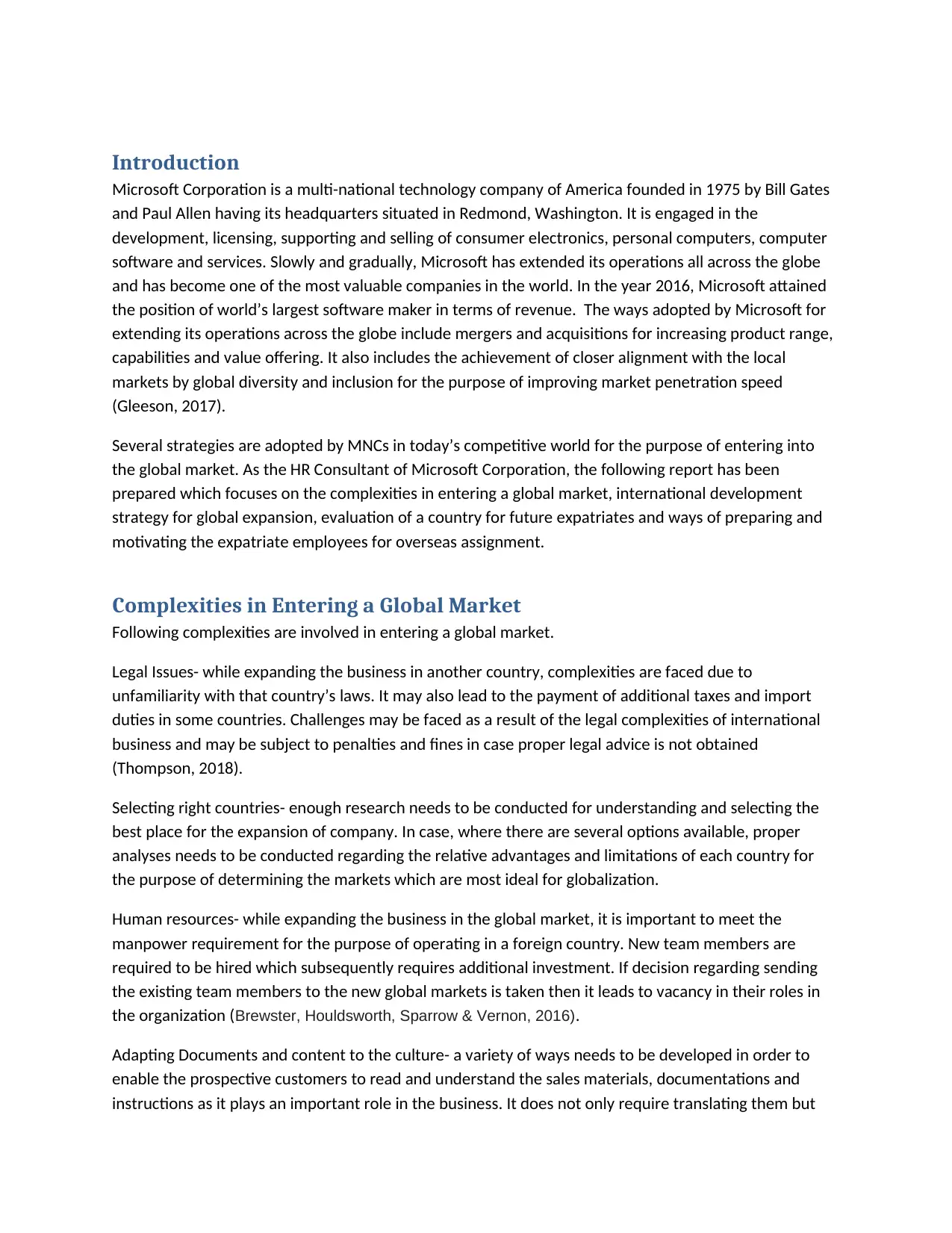
Introduction
Microsoft Corporation is a multi-national technology company of America founded in 1975 by Bill Gates
and Paul Allen having its headquarters situated in Redmond, Washington. It is engaged in the
development, licensing, supporting and selling of consumer electronics, personal computers, computer
software and services. Slowly and gradually, Microsoft has extended its operations all across the globe
and has become one of the most valuable companies in the world. In the year 2016, Microsoft attained
the position of world’s largest software maker in terms of revenue. The ways adopted by Microsoft for
extending its operations across the globe include mergers and acquisitions for increasing product range,
capabilities and value offering. It also includes the achievement of closer alignment with the local
markets by global diversity and inclusion for the purpose of improving market penetration speed
(Gleeson, 2017).
Several strategies are adopted by MNCs in today’s competitive world for the purpose of entering into
the global market. As the HR Consultant of Microsoft Corporation, the following report has been
prepared which focuses on the complexities in entering a global market, international development
strategy for global expansion, evaluation of a country for future expatriates and ways of preparing and
motivating the expatriate employees for overseas assignment.
Complexities in Entering a Global Market
Following complexities are involved in entering a global market.
Legal Issues- while expanding the business in another country, complexities are faced due to
unfamiliarity with that country’s laws. It may also lead to the payment of additional taxes and import
duties in some countries. Challenges may be faced as a result of the legal complexities of international
business and may be subject to penalties and fines in case proper legal advice is not obtained
(Thompson, 2018).
Selecting right countries- enough research needs to be conducted for understanding and selecting the
best place for the expansion of company. In case, where there are several options available, proper
analyses needs to be conducted regarding the relative advantages and limitations of each country for
the purpose of determining the markets which are most ideal for globalization.
Human resources- while expanding the business in the global market, it is important to meet the
manpower requirement for the purpose of operating in a foreign country. New team members are
required to be hired which subsequently requires additional investment. If decision regarding sending
the existing team members to the new global markets is taken then it leads to vacancy in their roles in
the organization (Brewster, Houldsworth, Sparrow & Vernon, 2016).
Adapting Documents and content to the culture- a variety of ways needs to be developed in order to
enable the prospective customers to read and understand the sales materials, documentations and
instructions as it plays an important role in the business. It does not only require translating them but
Microsoft Corporation is a multi-national technology company of America founded in 1975 by Bill Gates
and Paul Allen having its headquarters situated in Redmond, Washington. It is engaged in the
development, licensing, supporting and selling of consumer electronics, personal computers, computer
software and services. Slowly and gradually, Microsoft has extended its operations all across the globe
and has become one of the most valuable companies in the world. In the year 2016, Microsoft attained
the position of world’s largest software maker in terms of revenue. The ways adopted by Microsoft for
extending its operations across the globe include mergers and acquisitions for increasing product range,
capabilities and value offering. It also includes the achievement of closer alignment with the local
markets by global diversity and inclusion for the purpose of improving market penetration speed
(Gleeson, 2017).
Several strategies are adopted by MNCs in today’s competitive world for the purpose of entering into
the global market. As the HR Consultant of Microsoft Corporation, the following report has been
prepared which focuses on the complexities in entering a global market, international development
strategy for global expansion, evaluation of a country for future expatriates and ways of preparing and
motivating the expatriate employees for overseas assignment.
Complexities in Entering a Global Market
Following complexities are involved in entering a global market.
Legal Issues- while expanding the business in another country, complexities are faced due to
unfamiliarity with that country’s laws. It may also lead to the payment of additional taxes and import
duties in some countries. Challenges may be faced as a result of the legal complexities of international
business and may be subject to penalties and fines in case proper legal advice is not obtained
(Thompson, 2018).
Selecting right countries- enough research needs to be conducted for understanding and selecting the
best place for the expansion of company. In case, where there are several options available, proper
analyses needs to be conducted regarding the relative advantages and limitations of each country for
the purpose of determining the markets which are most ideal for globalization.
Human resources- while expanding the business in the global market, it is important to meet the
manpower requirement for the purpose of operating in a foreign country. New team members are
required to be hired which subsequently requires additional investment. If decision regarding sending
the existing team members to the new global markets is taken then it leads to vacancy in their roles in
the organization (Brewster, Houldsworth, Sparrow & Vernon, 2016).
Adapting Documents and content to the culture- a variety of ways needs to be developed in order to
enable the prospective customers to read and understand the sales materials, documentations and
instructions as it plays an important role in the business. It does not only require translating them but
Paraphrase This Document
Need a fresh take? Get an instant paraphrase of this document with our AI Paraphraser
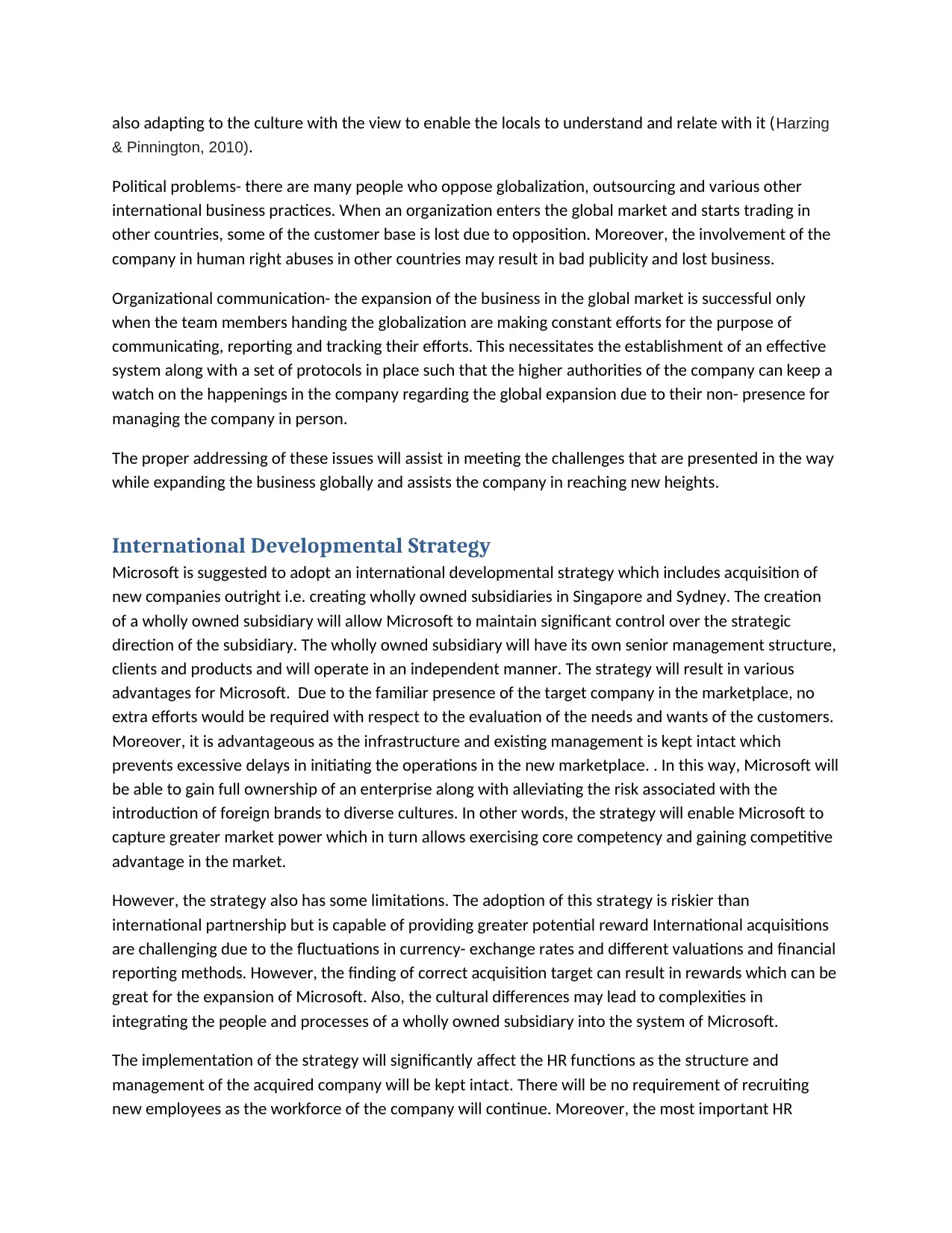
also adapting to the culture with the view to enable the locals to understand and relate with it (Harzing
& Pinnington, 2010).
Political problems- there are many people who oppose globalization, outsourcing and various other
international business practices. When an organization enters the global market and starts trading in
other countries, some of the customer base is lost due to opposition. Moreover, the involvement of the
company in human right abuses in other countries may result in bad publicity and lost business.
Organizational communication- the expansion of the business in the global market is successful only
when the team members handing the globalization are making constant efforts for the purpose of
communicating, reporting and tracking their efforts. This necessitates the establishment of an effective
system along with a set of protocols in place such that the higher authorities of the company can keep a
watch on the happenings in the company regarding the global expansion due to their non- presence for
managing the company in person.
The proper addressing of these issues will assist in meeting the challenges that are presented in the way
while expanding the business globally and assists the company in reaching new heights.
International Developmental Strategy
Microsoft is suggested to adopt an international developmental strategy which includes acquisition of
new companies outright i.e. creating wholly owned subsidiaries in Singapore and Sydney. The creation
of a wholly owned subsidiary will allow Microsoft to maintain significant control over the strategic
direction of the subsidiary. The wholly owned subsidiary will have its own senior management structure,
clients and products and will operate in an independent manner. The strategy will result in various
advantages for Microsoft. Due to the familiar presence of the target company in the marketplace, no
extra efforts would be required with respect to the evaluation of the needs and wants of the customers.
Moreover, it is advantageous as the infrastructure and existing management is kept intact which
prevents excessive delays in initiating the operations in the new marketplace. . In this way, Microsoft will
be able to gain full ownership of an enterprise along with alleviating the risk associated with the
introduction of foreign brands to diverse cultures. In other words, the strategy will enable Microsoft to
capture greater market power which in turn allows exercising core competency and gaining competitive
advantage in the market.
However, the strategy also has some limitations. The adoption of this strategy is riskier than
international partnership but is capable of providing greater potential reward International acquisitions
are challenging due to the fluctuations in currency- exchange rates and different valuations and financial
reporting methods. However, the finding of correct acquisition target can result in rewards which can be
great for the expansion of Microsoft. Also, the cultural differences may lead to complexities in
integrating the people and processes of a wholly owned subsidiary into the system of Microsoft.
The implementation of the strategy will significantly affect the HR functions as the structure and
management of the acquired company will be kept intact. There will be no requirement of recruiting
new employees as the workforce of the company will continue. Moreover, the most important HR
& Pinnington, 2010).
Political problems- there are many people who oppose globalization, outsourcing and various other
international business practices. When an organization enters the global market and starts trading in
other countries, some of the customer base is lost due to opposition. Moreover, the involvement of the
company in human right abuses in other countries may result in bad publicity and lost business.
Organizational communication- the expansion of the business in the global market is successful only
when the team members handing the globalization are making constant efforts for the purpose of
communicating, reporting and tracking their efforts. This necessitates the establishment of an effective
system along with a set of protocols in place such that the higher authorities of the company can keep a
watch on the happenings in the company regarding the global expansion due to their non- presence for
managing the company in person.
The proper addressing of these issues will assist in meeting the challenges that are presented in the way
while expanding the business globally and assists the company in reaching new heights.
International Developmental Strategy
Microsoft is suggested to adopt an international developmental strategy which includes acquisition of
new companies outright i.e. creating wholly owned subsidiaries in Singapore and Sydney. The creation
of a wholly owned subsidiary will allow Microsoft to maintain significant control over the strategic
direction of the subsidiary. The wholly owned subsidiary will have its own senior management structure,
clients and products and will operate in an independent manner. The strategy will result in various
advantages for Microsoft. Due to the familiar presence of the target company in the marketplace, no
extra efforts would be required with respect to the evaluation of the needs and wants of the customers.
Moreover, it is advantageous as the infrastructure and existing management is kept intact which
prevents excessive delays in initiating the operations in the new marketplace. . In this way, Microsoft will
be able to gain full ownership of an enterprise along with alleviating the risk associated with the
introduction of foreign brands to diverse cultures. In other words, the strategy will enable Microsoft to
capture greater market power which in turn allows exercising core competency and gaining competitive
advantage in the market.
However, the strategy also has some limitations. The adoption of this strategy is riskier than
international partnership but is capable of providing greater potential reward International acquisitions
are challenging due to the fluctuations in currency- exchange rates and different valuations and financial
reporting methods. However, the finding of correct acquisition target can result in rewards which can be
great for the expansion of Microsoft. Also, the cultural differences may lead to complexities in
integrating the people and processes of a wholly owned subsidiary into the system of Microsoft.
The implementation of the strategy will significantly affect the HR functions as the structure and
management of the acquired company will be kept intact. There will be no requirement of recruiting
new employees as the workforce of the company will continue. Moreover, the most important HR
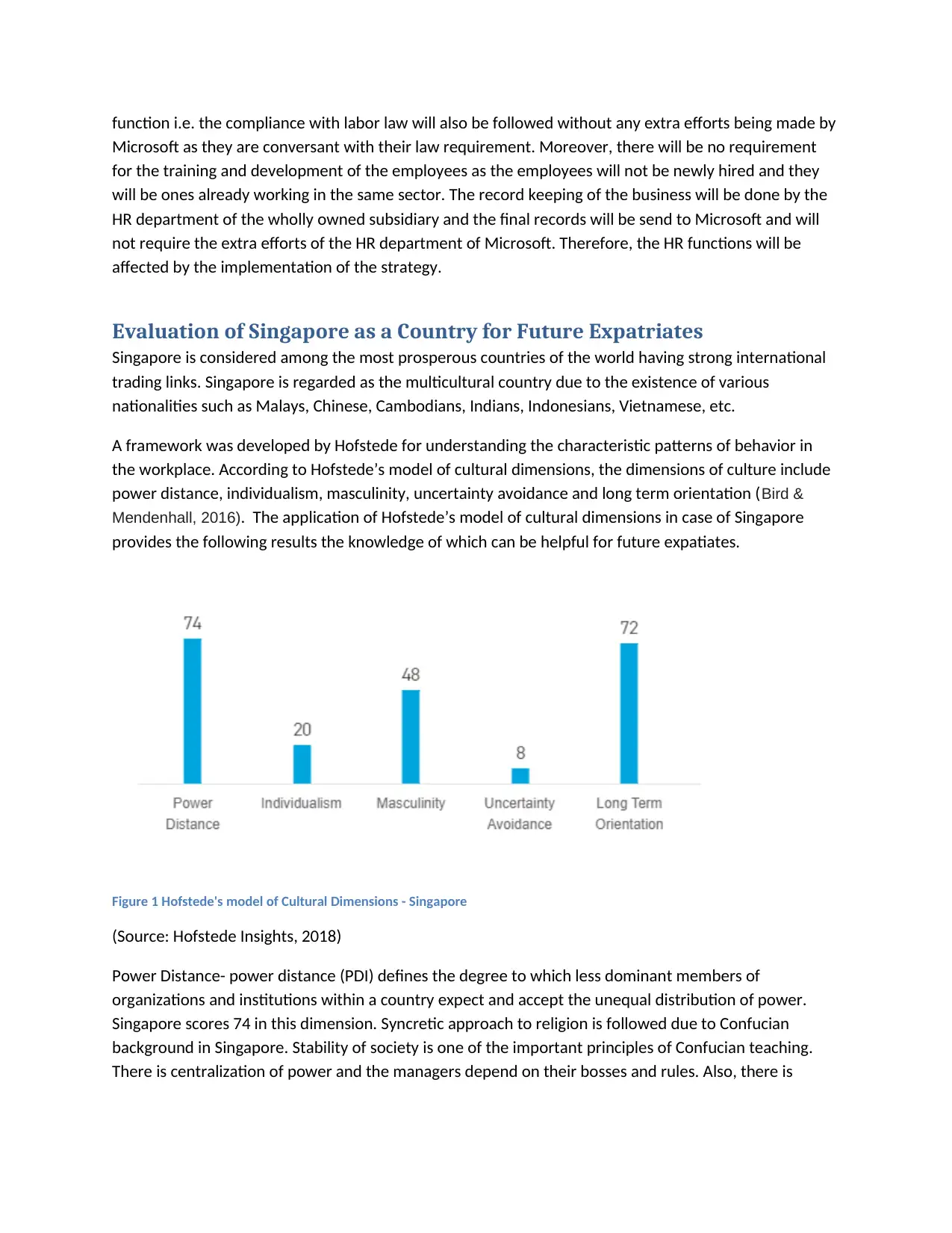
function i.e. the compliance with labor law will also be followed without any extra efforts being made by
Microsoft as they are conversant with their law requirement. Moreover, there will be no requirement
for the training and development of the employees as the employees will not be newly hired and they
will be ones already working in the same sector. The record keeping of the business will be done by the
HR department of the wholly owned subsidiary and the final records will be send to Microsoft and will
not require the extra efforts of the HR department of Microsoft. Therefore, the HR functions will be
affected by the implementation of the strategy.
Evaluation of Singapore as a Country for Future Expatriates
Singapore is considered among the most prosperous countries of the world having strong international
trading links. Singapore is regarded as the multicultural country due to the existence of various
nationalities such as Malays, Chinese, Cambodians, Indians, Indonesians, Vietnamese, etc.
A framework was developed by Hofstede for understanding the characteristic patterns of behavior in
the workplace. According to Hofstede’s model of cultural dimensions, the dimensions of culture include
power distance, individualism, masculinity, uncertainty avoidance and long term orientation (Bird &
Mendenhall, 2016). The application of Hofstede’s model of cultural dimensions in case of Singapore
provides the following results the knowledge of which can be helpful for future expatiates.
Figure 1 Hofstede's model of Cultural Dimensions - Singapore
(Source: Hofstede Insights, 2018)
Power Distance- power distance (PDI) defines the degree to which less dominant members of
organizations and institutions within a country expect and accept the unequal distribution of power.
Singapore scores 74 in this dimension. Syncretic approach to religion is followed due to Confucian
background in Singapore. Stability of society is one of the important principles of Confucian teaching.
There is centralization of power and the managers depend on their bosses and rules. Also, there is
Microsoft as they are conversant with their law requirement. Moreover, there will be no requirement
for the training and development of the employees as the employees will not be newly hired and they
will be ones already working in the same sector. The record keeping of the business will be done by the
HR department of the wholly owned subsidiary and the final records will be send to Microsoft and will
not require the extra efforts of the HR department of Microsoft. Therefore, the HR functions will be
affected by the implementation of the strategy.
Evaluation of Singapore as a Country for Future Expatriates
Singapore is considered among the most prosperous countries of the world having strong international
trading links. Singapore is regarded as the multicultural country due to the existence of various
nationalities such as Malays, Chinese, Cambodians, Indians, Indonesians, Vietnamese, etc.
A framework was developed by Hofstede for understanding the characteristic patterns of behavior in
the workplace. According to Hofstede’s model of cultural dimensions, the dimensions of culture include
power distance, individualism, masculinity, uncertainty avoidance and long term orientation (Bird &
Mendenhall, 2016). The application of Hofstede’s model of cultural dimensions in case of Singapore
provides the following results the knowledge of which can be helpful for future expatiates.
Figure 1 Hofstede's model of Cultural Dimensions - Singapore
(Source: Hofstede Insights, 2018)
Power Distance- power distance (PDI) defines the degree to which less dominant members of
organizations and institutions within a country expect and accept the unequal distribution of power.
Singapore scores 74 in this dimension. Syncretic approach to religion is followed due to Confucian
background in Singapore. Stability of society is one of the important principles of Confucian teaching.
There is centralization of power and the managers depend on their bosses and rules. Also, there is
⊘ This is a preview!⊘
Do you want full access?
Subscribe today to unlock all pages.

Trusted by 1+ million students worldwide
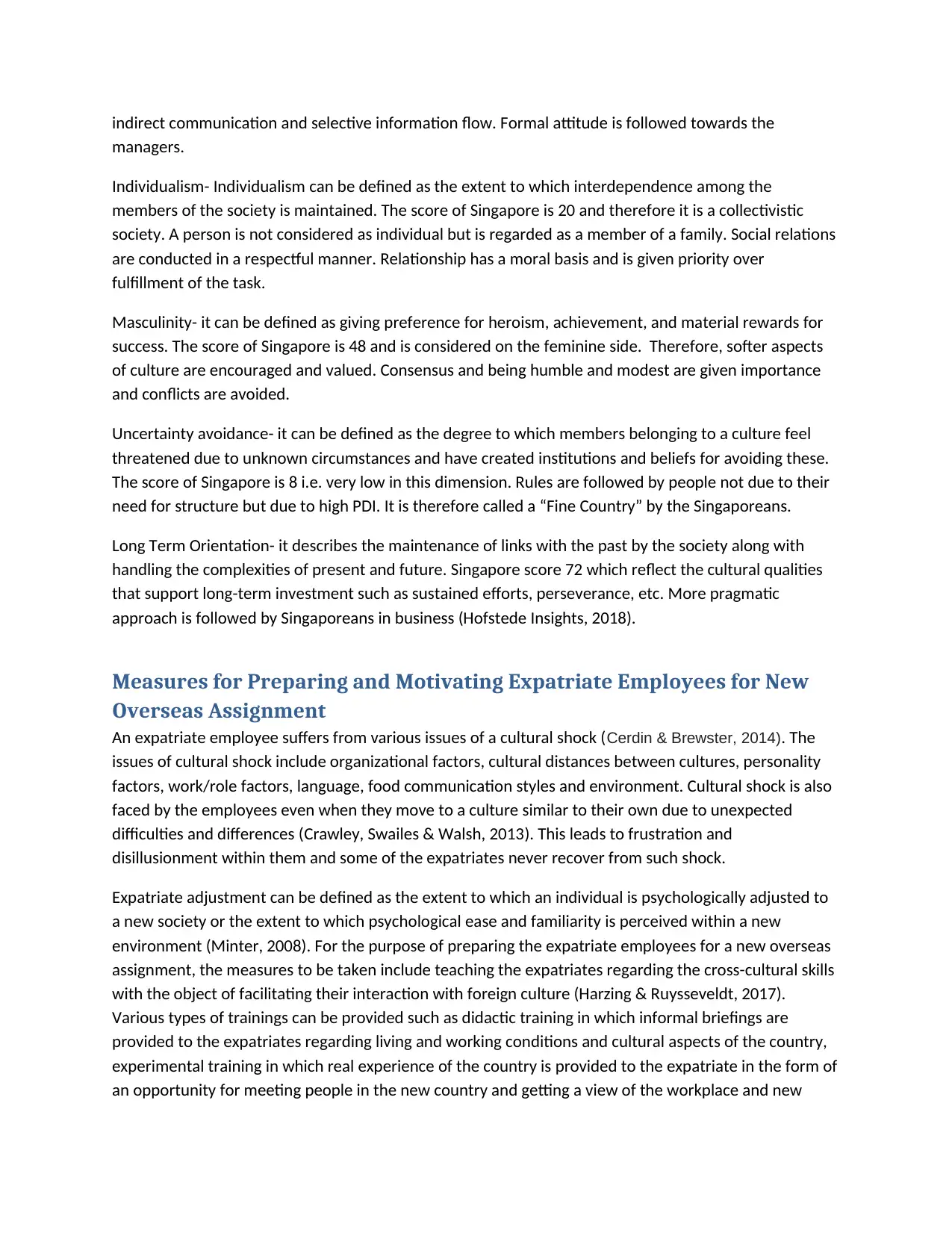
indirect communication and selective information flow. Formal attitude is followed towards the
managers.
Individualism- Individualism can be defined as the extent to which interdependence among the
members of the society is maintained. The score of Singapore is 20 and therefore it is a collectivistic
society. A person is not considered as individual but is regarded as a member of a family. Social relations
are conducted in a respectful manner. Relationship has a moral basis and is given priority over
fulfillment of the task.
Masculinity- it can be defined as giving preference for heroism, achievement, and material rewards for
success. The score of Singapore is 48 and is considered on the feminine side. Therefore, softer aspects
of culture are encouraged and valued. Consensus and being humble and modest are given importance
and conflicts are avoided.
Uncertainty avoidance- it can be defined as the degree to which members belonging to a culture feel
threatened due to unknown circumstances and have created institutions and beliefs for avoiding these.
The score of Singapore is 8 i.e. very low in this dimension. Rules are followed by people not due to their
need for structure but due to high PDI. It is therefore called a “Fine Country” by the Singaporeans.
Long Term Orientation- it describes the maintenance of links with the past by the society along with
handling the complexities of present and future. Singapore score 72 which reflect the cultural qualities
that support long-term investment such as sustained efforts, perseverance, etc. More pragmatic
approach is followed by Singaporeans in business (Hofstede Insights, 2018).
Measures for Preparing and Motivating Expatriate Employees for New
Overseas Assignment
An expatriate employee suffers from various issues of a cultural shock (Cerdin & Brewster, 2014). The
issues of cultural shock include organizational factors, cultural distances between cultures, personality
factors, work/role factors, language, food communication styles and environment. Cultural shock is also
faced by the employees even when they move to a culture similar to their own due to unexpected
difficulties and differences (Crawley, Swailes & Walsh, 2013). This leads to frustration and
disillusionment within them and some of the expatriates never recover from such shock.
Expatriate adjustment can be defined as the extent to which an individual is psychologically adjusted to
a new society or the extent to which psychological ease and familiarity is perceived within a new
environment (Minter, 2008). For the purpose of preparing the expatriate employees for a new overseas
assignment, the measures to be taken include teaching the expatriates regarding the cross-cultural skills
with the object of facilitating their interaction with foreign culture (Harzing & Ruysseveldt, 2017).
Various types of trainings can be provided such as didactic training in which informal briefings are
provided to the expatriates regarding living and working conditions and cultural aspects of the country,
experimental training in which real experience of the country is provided to the expatriate in the form of
an opportunity for meeting people in the new country and getting a view of the workplace and new
managers.
Individualism- Individualism can be defined as the extent to which interdependence among the
members of the society is maintained. The score of Singapore is 20 and therefore it is a collectivistic
society. A person is not considered as individual but is regarded as a member of a family. Social relations
are conducted in a respectful manner. Relationship has a moral basis and is given priority over
fulfillment of the task.
Masculinity- it can be defined as giving preference for heroism, achievement, and material rewards for
success. The score of Singapore is 48 and is considered on the feminine side. Therefore, softer aspects
of culture are encouraged and valued. Consensus and being humble and modest are given importance
and conflicts are avoided.
Uncertainty avoidance- it can be defined as the degree to which members belonging to a culture feel
threatened due to unknown circumstances and have created institutions and beliefs for avoiding these.
The score of Singapore is 8 i.e. very low in this dimension. Rules are followed by people not due to their
need for structure but due to high PDI. It is therefore called a “Fine Country” by the Singaporeans.
Long Term Orientation- it describes the maintenance of links with the past by the society along with
handling the complexities of present and future. Singapore score 72 which reflect the cultural qualities
that support long-term investment such as sustained efforts, perseverance, etc. More pragmatic
approach is followed by Singaporeans in business (Hofstede Insights, 2018).
Measures for Preparing and Motivating Expatriate Employees for New
Overseas Assignment
An expatriate employee suffers from various issues of a cultural shock (Cerdin & Brewster, 2014). The
issues of cultural shock include organizational factors, cultural distances between cultures, personality
factors, work/role factors, language, food communication styles and environment. Cultural shock is also
faced by the employees even when they move to a culture similar to their own due to unexpected
difficulties and differences (Crawley, Swailes & Walsh, 2013). This leads to frustration and
disillusionment within them and some of the expatriates never recover from such shock.
Expatriate adjustment can be defined as the extent to which an individual is psychologically adjusted to
a new society or the extent to which psychological ease and familiarity is perceived within a new
environment (Minter, 2008). For the purpose of preparing the expatriate employees for a new overseas
assignment, the measures to be taken include teaching the expatriates regarding the cross-cultural skills
with the object of facilitating their interaction with foreign culture (Harzing & Ruysseveldt, 2017).
Various types of trainings can be provided such as didactic training in which informal briefings are
provided to the expatriates regarding living and working conditions and cultural aspects of the country,
experimental training in which real experience of the country is provided to the expatriate in the form of
an opportunity for meeting people in the new country and getting a view of the workplace and new
Paraphrase This Document
Need a fresh take? Get an instant paraphrase of this document with our AI Paraphraser
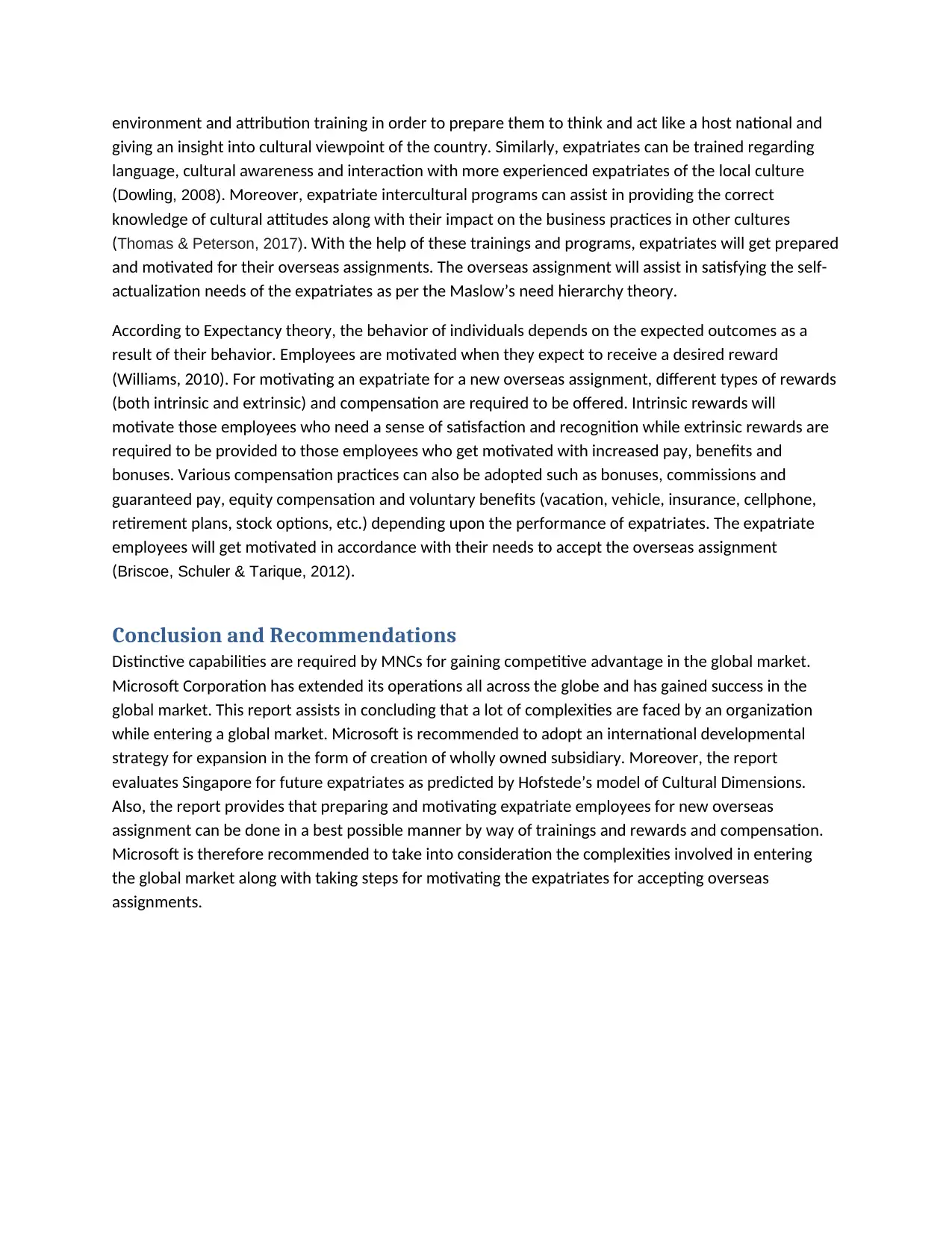
environment and attribution training in order to prepare them to think and act like a host national and
giving an insight into cultural viewpoint of the country. Similarly, expatriates can be trained regarding
language, cultural awareness and interaction with more experienced expatriates of the local culture
(Dowling, 2008). Moreover, expatriate intercultural programs can assist in providing the correct
knowledge of cultural attitudes along with their impact on the business practices in other cultures
(Thomas & Peterson, 2017). With the help of these trainings and programs, expatriates will get prepared
and motivated for their overseas assignments. The overseas assignment will assist in satisfying the self-
actualization needs of the expatriates as per the Maslow’s need hierarchy theory.
According to Expectancy theory, the behavior of individuals depends on the expected outcomes as a
result of their behavior. Employees are motivated when they expect to receive a desired reward
(Williams, 2010). For motivating an expatriate for a new overseas assignment, different types of rewards
(both intrinsic and extrinsic) and compensation are required to be offered. Intrinsic rewards will
motivate those employees who need a sense of satisfaction and recognition while extrinsic rewards are
required to be provided to those employees who get motivated with increased pay, benefits and
bonuses. Various compensation practices can also be adopted such as bonuses, commissions and
guaranteed pay, equity compensation and voluntary benefits (vacation, vehicle, insurance, cellphone,
retirement plans, stock options, etc.) depending upon the performance of expatriates. The expatriate
employees will get motivated in accordance with their needs to accept the overseas assignment
(Briscoe, Schuler & Tarique, 2012).
Conclusion and Recommendations
Distinctive capabilities are required by MNCs for gaining competitive advantage in the global market.
Microsoft Corporation has extended its operations all across the globe and has gained success in the
global market. This report assists in concluding that a lot of complexities are faced by an organization
while entering a global market. Microsoft is recommended to adopt an international developmental
strategy for expansion in the form of creation of wholly owned subsidiary. Moreover, the report
evaluates Singapore for future expatriates as predicted by Hofstede’s model of Cultural Dimensions.
Also, the report provides that preparing and motivating expatriate employees for new overseas
assignment can be done in a best possible manner by way of trainings and rewards and compensation.
Microsoft is therefore recommended to take into consideration the complexities involved in entering
the global market along with taking steps for motivating the expatriates for accepting overseas
assignments.
giving an insight into cultural viewpoint of the country. Similarly, expatriates can be trained regarding
language, cultural awareness and interaction with more experienced expatriates of the local culture
(Dowling, 2008). Moreover, expatriate intercultural programs can assist in providing the correct
knowledge of cultural attitudes along with their impact on the business practices in other cultures
(Thomas & Peterson, 2017). With the help of these trainings and programs, expatriates will get prepared
and motivated for their overseas assignments. The overseas assignment will assist in satisfying the self-
actualization needs of the expatriates as per the Maslow’s need hierarchy theory.
According to Expectancy theory, the behavior of individuals depends on the expected outcomes as a
result of their behavior. Employees are motivated when they expect to receive a desired reward
(Williams, 2010). For motivating an expatriate for a new overseas assignment, different types of rewards
(both intrinsic and extrinsic) and compensation are required to be offered. Intrinsic rewards will
motivate those employees who need a sense of satisfaction and recognition while extrinsic rewards are
required to be provided to those employees who get motivated with increased pay, benefits and
bonuses. Various compensation practices can also be adopted such as bonuses, commissions and
guaranteed pay, equity compensation and voluntary benefits (vacation, vehicle, insurance, cellphone,
retirement plans, stock options, etc.) depending upon the performance of expatriates. The expatriate
employees will get motivated in accordance with their needs to accept the overseas assignment
(Briscoe, Schuler & Tarique, 2012).
Conclusion and Recommendations
Distinctive capabilities are required by MNCs for gaining competitive advantage in the global market.
Microsoft Corporation has extended its operations all across the globe and has gained success in the
global market. This report assists in concluding that a lot of complexities are faced by an organization
while entering a global market. Microsoft is recommended to adopt an international developmental
strategy for expansion in the form of creation of wholly owned subsidiary. Moreover, the report
evaluates Singapore for future expatriates as predicted by Hofstede’s model of Cultural Dimensions.
Also, the report provides that preparing and motivating expatriate employees for new overseas
assignment can be done in a best possible manner by way of trainings and rewards and compensation.
Microsoft is therefore recommended to take into consideration the complexities involved in entering
the global market along with taking steps for motivating the expatriates for accepting overseas
assignments.
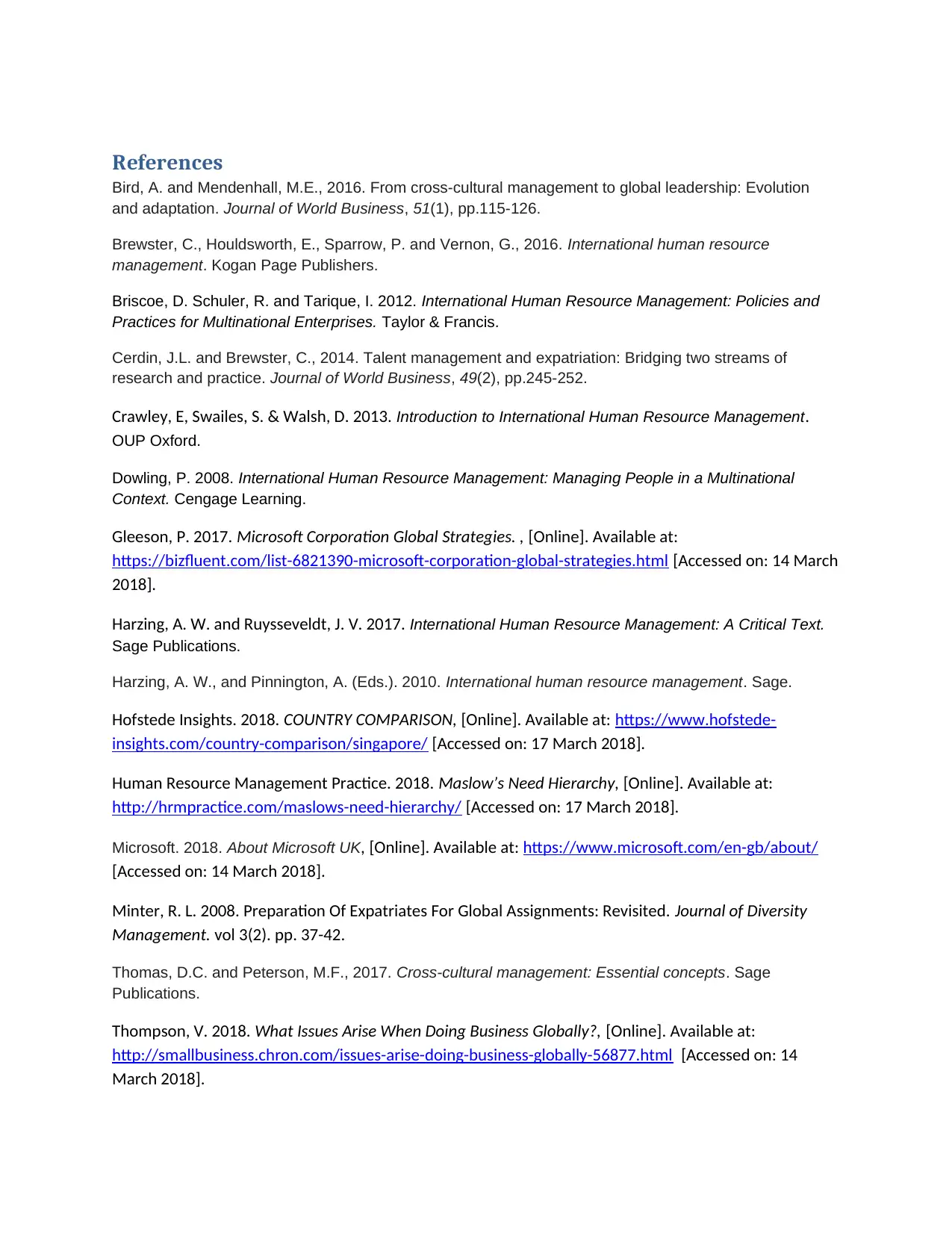
References
Bird, A. and Mendenhall, M.E., 2016. From cross-cultural management to global leadership: Evolution
and adaptation. Journal of World Business, 51(1), pp.115-126.
Brewster, C., Houldsworth, E., Sparrow, P. and Vernon, G., 2016. International human resource
management. Kogan Page Publishers.
Briscoe, D. Schuler, R. and Tarique, I. 2012. International Human Resource Management: Policies and
Practices for Multinational Enterprises. Taylor & Francis.
Cerdin, J.L. and Brewster, C., 2014. Talent management and expatriation: Bridging two streams of
research and practice. Journal of World Business, 49(2), pp.245-252.
Crawley, E, Swailes, S. & Walsh, D. 2013. Introduction to International Human Resource Management.
OUP Oxford.
Dowling, P. 2008. International Human Resource Management: Managing People in a Multinational
Context. Cengage Learning.
Gleeson, P. 2017. Microsoft Corporation Global Strategies. , [Online]. Available at:
https://bizfluent.com/list-6821390-microsoft-corporation-global-strategies.html [Accessed on: 14 March
2018].
Harzing, A. W. and Ruysseveldt, J. V. 2017. International Human Resource Management: A Critical Text.
Sage Publications.
Harzing, A. W., and Pinnington, A. (Eds.). 2010. International human resource management. Sage.
Hofstede Insights. 2018. COUNTRY COMPARISON, [Online]. Available at: https://www.hofstede-
insights.com/country-comparison/singapore/ [Accessed on: 17 March 2018].
Human Resource Management Practice. 2018. Maslow’s Need Hierarchy, [Online]. Available at:
http://hrmpractice.com/maslows-need-hierarchy/ [Accessed on: 17 March 2018].
Microsoft. 2018. About Microsoft UK, [Online]. Available at: https://www.microsoft.com/en-gb/about/
[Accessed on: 14 March 2018].
Minter, R. L. 2008. Preparation Of Expatriates For Global Assignments: Revisited. Journal of Diversity
Management. vol 3(2). pp. 37-42.
Thomas, D.C. and Peterson, M.F., 2017. Cross-cultural management: Essential concepts. Sage
Publications.
Thompson, V. 2018. What Issues Arise When Doing Business Globally?, [Online]. Available at:
http://smallbusiness.chron.com/issues-arise-doing-business-globally-56877.html [Accessed on: 14
March 2018].
Bird, A. and Mendenhall, M.E., 2016. From cross-cultural management to global leadership: Evolution
and adaptation. Journal of World Business, 51(1), pp.115-126.
Brewster, C., Houldsworth, E., Sparrow, P. and Vernon, G., 2016. International human resource
management. Kogan Page Publishers.
Briscoe, D. Schuler, R. and Tarique, I. 2012. International Human Resource Management: Policies and
Practices for Multinational Enterprises. Taylor & Francis.
Cerdin, J.L. and Brewster, C., 2014. Talent management and expatriation: Bridging two streams of
research and practice. Journal of World Business, 49(2), pp.245-252.
Crawley, E, Swailes, S. & Walsh, D. 2013. Introduction to International Human Resource Management.
OUP Oxford.
Dowling, P. 2008. International Human Resource Management: Managing People in a Multinational
Context. Cengage Learning.
Gleeson, P. 2017. Microsoft Corporation Global Strategies. , [Online]. Available at:
https://bizfluent.com/list-6821390-microsoft-corporation-global-strategies.html [Accessed on: 14 March
2018].
Harzing, A. W. and Ruysseveldt, J. V. 2017. International Human Resource Management: A Critical Text.
Sage Publications.
Harzing, A. W., and Pinnington, A. (Eds.). 2010. International human resource management. Sage.
Hofstede Insights. 2018. COUNTRY COMPARISON, [Online]. Available at: https://www.hofstede-
insights.com/country-comparison/singapore/ [Accessed on: 17 March 2018].
Human Resource Management Practice. 2018. Maslow’s Need Hierarchy, [Online]. Available at:
http://hrmpractice.com/maslows-need-hierarchy/ [Accessed on: 17 March 2018].
Microsoft. 2018. About Microsoft UK, [Online]. Available at: https://www.microsoft.com/en-gb/about/
[Accessed on: 14 March 2018].
Minter, R. L. 2008. Preparation Of Expatriates For Global Assignments: Revisited. Journal of Diversity
Management. vol 3(2). pp. 37-42.
Thomas, D.C. and Peterson, M.F., 2017. Cross-cultural management: Essential concepts. Sage
Publications.
Thompson, V. 2018. What Issues Arise When Doing Business Globally?, [Online]. Available at:
http://smallbusiness.chron.com/issues-arise-doing-business-globally-56877.html [Accessed on: 14
March 2018].
⊘ This is a preview!⊘
Do you want full access?
Subscribe today to unlock all pages.

Trusted by 1+ million students worldwide
1 out of 6
Related Documents
Your All-in-One AI-Powered Toolkit for Academic Success.
+13062052269
info@desklib.com
Available 24*7 on WhatsApp / Email
![[object Object]](/_next/static/media/star-bottom.7253800d.svg)
Unlock your academic potential
Copyright © 2020–2026 A2Z Services. All Rights Reserved. Developed and managed by ZUCOL.





